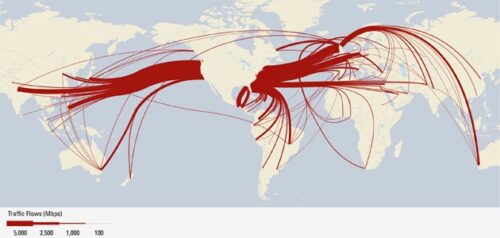The BBC reports that a group has used telephone calls to illustrate social networks on a map of the UK
[Carlo Ratti of the Massachusetts Institute of Technology’s] team used records of more than 12 billion anonymised landline telephone calls, to model who Britons frequently spoke to.
These records allowed the team identify the the local telephone exchanges used in the calls.
Where people spoke frequently and for extended periods, they were treated as having a stronger connection, Mr Ratti told BBC News.
A map created using those connections showed that people tended to communicate most with people that we geographically close to them, he added.
Colorful map but I see no mention of toll rates. This study seems to confirm that since it costs more to communicate by phone over distance, people prefer geographical closeness (e.g. not paying additional fees). The very least they could do is include a map of the boundary for local toll fees to correlate with closeness of callers.
Calls are anonymous, which also suggests there is no differentiation between social communication versus non-social (business?). A retailer that has to call various warehouses to make an order might be represented in a social map with equal weight as two friends that like to stay in touch because they belong to a social network.
I also wonder about a single telephone number that represents many social networks and sharing (such as a village phone-box, a dormitory, hotel, etc.), as I have mentioned before. How does a call-center get factored into this map (no inbound but many outbound)? It is so technology specific that a rural community where people walk and talk in person daily, if not hourly, could be non-existent on the social networking map versus an industrial park with only a telemarketing presence.
Are we really looking at social networks? My guess is that the map gets called “social” because it is an area of funding/interest, even though it looks more like a generic utilization heat map for land lines.
It would be far more interesting if the map tried to bring forward social network elements. Take football, for example. Where are conversations about football preferred, urban or rural areas? Privacy would be an issue, of course, but this map begs the question whether social groups can be assumed from anonymous data. My fax would argue no.
The NSA might argue yes, but they also like to route phone calls through American switches and make the US look very popular as a call destination.
